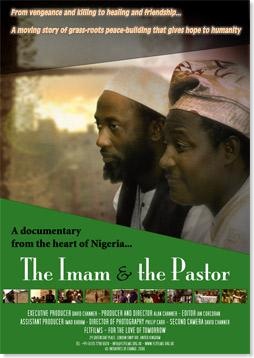The Imam is tall, slender, academic but in a wholly engaging way. The Pastor has a boxer’s build and is as fiery and passionate as a Pentecostal can be. The Imam’s eyes light up with experience and intelligence as he speaks of his Islamic faith. The pastor, reflecting on Christianity’s teaching on peace, radiates an urgent and hard won love. The Imam looks at the pastor with the tenderness of a mother and says he likes him even though he’s a Christian. The pastor returns the gaze and then looking back at the camera, says, “I love him because my faith teaches me to love my brothers. He is my brother, we are husband and wife, for the sake of ourselves and of our children we must stay together, we must not separate.”
 This exchange of humanity goes on even as they speak of the teachings of their diverse faiths. A diversity says the pastor–without any note of paradox–that allows them to live together. And they have been living and traveling together for the past 12 years.
This exchange of humanity goes on even as they speak of the teachings of their diverse faiths. A diversity says the pastor–without any note of paradox–that allows them to live together. And they have been living and traveling together for the past 12 years.
This dialogue and human exchange is rare enough. Now consider that the contextual experience, the immediate history of each man is one of having personal and community property burned and looted, and as having lost family members to a raging violence endorsed and perpetrated by each of these men upon the other and upon their perspective religious communities.
I had the opportunity to view this remarkable documentary the other evening at All Saints. It’s a film of reconciliation–of how perpetrators of violence become instigators of peace–and it should be required viewing in mosques and churches across the country.
When you consider the pressure upon these men to take revenge, to keep the cycle of reciprocal violence going, when you consider the slender thread of trust that had to hold all the these opposites and the oppositions together, that had to overcome the welling up of unbidden hate…as for example–in the early stages of their relationship, the very real temptation the pastor had to smother the sleeping Imam with his own pillow–you understand you are in the presence of something like a modern miracle.
You understand that in some deeper sense both are Imams, and both are pastors. They have become brothers. Not because either has given up their faith. In fact, we come to see that it’s precisely a closely practised faith that allows each man a connecting point beyond their situations.

I enjoyed this blog and several of your photos. I’ve been looking up “mercy.”
Thanks for your continuing brilliance and depth Mr. Mercy. However, when you note that “this exchange of humanity goes on even as they speak of the teachings of their diverse faiths”, that word “even” causes me to cringe. It’s sad that theirs is a “remarkable” journey. Shouldn’t their peaceful behaviour be the norm, especially for religious leaders? It’s not, I think, because their respective faiths continue to claim to be the only way to God. Could it be that these men are remarkable in spite of their faith, not because of it.
Jeff, you do muddy the waters, always with the salient questions.
I agree completely that peaceful behaviour should be an unremarkable aspect of their lives. They are, after all, Pastor and Imam. Unfortunately–and this the documentary brings out obviously better than my post– the deep seated tribal/socio-religious world they inhabit almost makes rivalry “natural.” The remarkable thing is their overcoming that milieu.
So I think these men are remarkable both in spite of and because of their faith. In spite of–because the baser elements within their faiths (whether native or not is another debatable issue) conspire to have them continue the hostility. And because of–because they both claim that the primary teaching of their faith is non-violent and it’s this “discovery” that’s enabled each to reach out to the other.
I guess the “even” (good catch) that makes us cringe points to those base elements of “uber-faith.”